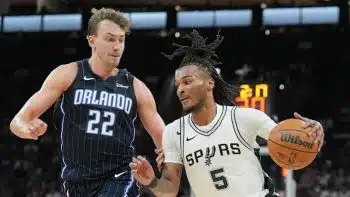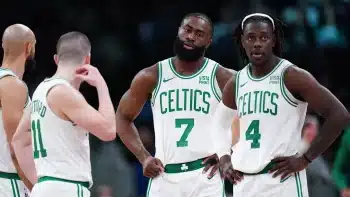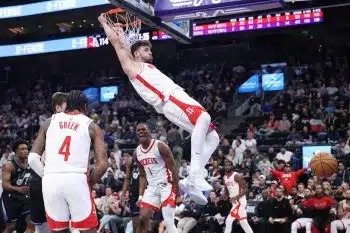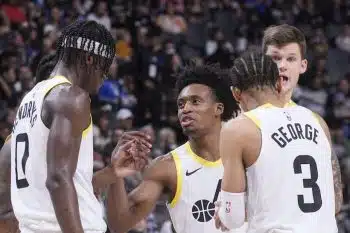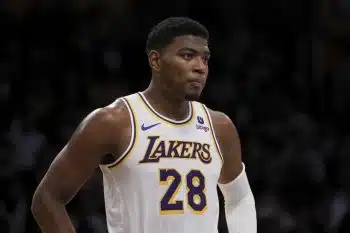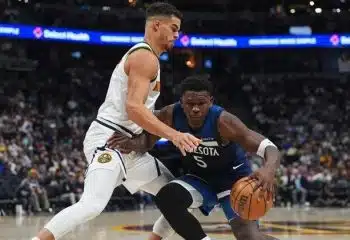NBA
What’s It Like To Be a Teenager in the NBA?
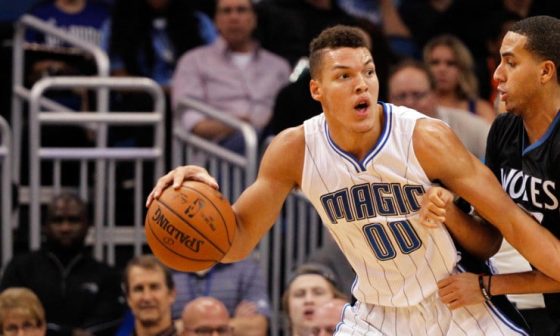
We often hear about the rise and fall of child stars in the entertainment industry. Tabloids love to cover a prodigy’s ascent to stardom, and then eventually chronicle their missteps, destructive behavior and downward spiral. This leads many to believe that teenagers can’t possibly succeed when put in these situations with millions of dollars, immense pressure, worldwide fame and a ballooned ego. It seems to spell disaster for young, impressionable individuals.
However, the entertainment industry isn’t the only field investing a lot of time and money into teenagers. Each year, a new wave of teens enters the NBA. Even though the league’s age limit has prohibited players from jumping directly to the NBA from high school since 2005, there are still plenty of prospects who enter the world’s top basketball league at 18 or 19 years old after one collegiate season.
Look no further than the 2014 NBA Draft for evidence, as four of the top five selections were 19-year-olds (and the lone exception, Joel Embiid, had just turned 20 years old three months earlier). In fact, 40 percent of the first-round selections in the 2014 draft were teenagers as of draft night.
Being a teenager can be tough, even if you’re just an average kid dealing with everyday issues and trying to blend in at high school. Being a teenager who is constantly under the microscope and has a ridiculous amount of money, fame and temptations can be quite the experience – good and bad – as well.
There have been many teenagers who have thrived in the league, including superstars like Kobe Bryant, Kevin Garnett, Tracy McGrady and LeBron James. But for every success story, there are many players who failed to make the transition to the NBA as teenagers – for reasons on the court, off the court or sometimes both.
NBA executives have plenty of horror stories about teens who had all of the athletic talent necessary to play in the NBA, but didn’t make it because they weren’t mature enough. The individuals who struggle are often the ones who continue acting like a typical teenager rather than growing up and being a professional. They oversleep, eat fast food and have their priorities out of order. Many mismanage their money, especially when they are trying to keep up with the spending habits of their veteran teammates who have much larger contracts and much more saved up from their time in the league. For many, it’s also the first time they’ve lived on their own and had any freedom, which can lead to issues as well. One executive described a high-profile prospect who had issues with basic things like paying his bills and opening a bank account.
Some players who enter the NBA too young make mistakes that ruin their career; some even ruin their life. Robert Swift, who entered the NBA as a teenager in 2004, is a self-described heroin addict who made headlines recently after being arrested following an armed home invasion attempt. Swift’s issues began as his professional basketball career flamed out, and now his life is a mess at 29 years old.
Every teenager who enters the league has a different experience. Many have succeeded, many have failed, many have landed somewhere in the middle of that spectrum. While they all have their rookie age in common, each situation is unique with different circumstances that affect their career trajectory. Basketball Insiders wanted to find out exactly what it’s like to be a teenager in the NBA, so we spoke to Aaron Gordon, Trevor Ariza and Dorell Wright – all of whom entered the league during their teen years – about their experiences.
***
Orlando Magic forward Aaron Gordon strutted into the locker room, bobbing his head to music coming from his headphones and donning his game face. He sat down in front of his locker and was clearly trying to focus on that evening’s game, which was set to tip off in less than an hour. There was game film of that night’s opponent playing on a big screen television in the middle of the locker room and he watched intently, while continuing to listen to his music. Gordon just turned 19 years old in September, but he carries himself like a professional.
However, one small detail made it very hard to take Gordon seriously. He was wearing a bright pink backpack with an enormous picture of Barbie on it. As serious and in the zone as he was, it’s pretty hard for anyone other than an elementary school girl to look cool while wearing that backpack.
This is the life of an NBA rookie. Early in the season, Gordon had to wear his Barbie backpack everywhere – to hotels, on the plane, in the locker room – otherwise he would be in trouble with the team’s veterans. Elfrid Payton had to do the same with a pink Minnie Mouse backpack and Devyn Marble had to sport a purple Frozen bag featuring Anna and Elsa. Channing Frye, a nine-year NBA veteran, was the one who came up with the idea and enforced it. Gordon actually had it easy compared to some first-year players, considering when Frye was on the Phoenix Suns he made rookie Earl Clark wear a large banana costume out in public.
“It was just the Barbie backpack, that’s mainly it,” Gordon said with a laugh when asked about the extent of his rookie hazing. “It was really just in the beginning of the season. I think they just wanted to see if we would do it. And we did it, so they’ve kind of taken it easy on us from there.”
Around this time last year, Gordon had a backpack full of college textbooks and homework (and without Barbie, I’m assuming), since he was attending the University of Arizona. In addition to living the college life, he was trying to showcase his skill set to NBA decision-makers so that he’d be mentioned as a top prospect in the 2014 NBA Draft and in the same sentence as elite freshmen Andrew Wiggins, Jabari Parker, Julius Randle and Joel Embiid. He was trying to prove that he wasn’t a tweener without a position, and that he had a quality arsenal of skills to go along with his phenomenal athleticism.
He did all of the above throughout his lone collegiate season with the Wildcats, which is why the Magic selected him with the No. 4 overall pick in the 2014 NBA Draft. He’s now viewed as a franchise cornerstone for the Magic, and he’ll earn $3,992,040 to play the game he loves this season (more than every 2014-15 rookie aside from Wiggins, Parker and Embiid).
He remembers his high school days like they were yesterday and he’s not old enough to legally drink or reserve many hotel rooms on his own. Yet, he’s viewed as a potential savior of a billion-dollar organization. That’s a lot of pressure for a kid and he admits he’s had to mature a lot faster than most of his peers – many of whom are still cramming for exams and trying to find their next party.
“There are definitely some aspects that you need to mature quicker about – when it comes to money, when it comes to taking care of your body, when it comes to making good use of your time,” Gordon said. “But at the end of the day, I’m still a teenager. And I’m always going to be a kid at heart.”
One of the biggest changes in Gordon’s life is obviously the number of zeros in his bank account. He has always wanted to play in the NBA because it is his dream job, and he insists the lucrative salary is just a bonus on top of that. Most 19-year-olds would make some questionable purchases if they suddenly had nearly $4 million at their fingertips, but Gordon has tried to be responsible with his money. His priority is taking care of his family, but he does admit that it’s nice being able to afford most things and having that financial safety net.
“It’s really cool to not really have to stress about how you’re going to buy a gift for your sister or how you’re going to pay your bills or how you’re going to help your mom if she is struggling,” Gordon said. “But from the moment I started playing basketball, I never played for money. I’m going to keep that mentality until I stop playing. I’m never playing for money.”
While the Magic are a very young team, Gordon is the only teenager on the roster. He has a number of younger friends on the team that he spends his free time with, such as Elfrid Payton (20), Victor Oladipo (21), Maurice Harkless (22), Tobias Harris (22) and Kyle O’Quinn (24). Harkless and Harris each entered the league as teens too, so they understand what he’s going through.
Gordon also tries to spend time with the team’s older players and learn as much as possible from them, but he has noticed that it’s sometimes difficult for him to relate to the veterans since their lifestyle differs from his. Many of them have a wife and kids, businesses outside of basketball and a very different set of priorities.
“We see the world from different perspectives,” Gordon said of the team’s veterans. “That’s just a part of me being an individual and also being younger and not being around [that lifestyle]. There definitely is age gap, but when you go on the court it really doesn’t matter at all. They have really helped me too. Channing Frye, who also went to Arizona, has been great. Ben Gordon, Luke Ridnour and Willie Green too. Those are the four veterans on our team and they take good care of me.”
It’s not just the veterans who have been friendly to Gordon and welcomed the rookie with open arms. He has been very impressed with the Magic organization as a whole, because everyone has treated him better than he ever could’ve anticipated and helped him with his adjustment to the league. It seems he heard many stories of the NBA being a ruthless business and was expecting a dog-eat-dog mentality, but that hasn’t been the case thus far. He has been pleasantly surprised by the family-like atmosphere in Orlando, where everyone has been friendly.
“I think one of the biggest surprises has just been the amount of good people I have in my organization,” Gordon said. “You almost feel like the NBA is strictly 100 percent business, but the people on my team have been real nice to me, real cool and just good teammates.”
Being a top-four draft pick and signing a lucrative contract brings on high expectations. A player picked as high as Gordon is typically expected to become a star. However, Gordon has tried not to think about where he was selected and just play his game.
“I think once you get drafted, after about two weeks you stop having a number and you start just being a basketball player again,” Gordon said. “You know? There have been great players in this league that have been second-round picks and there have been great players in this league that have been No. 1 picks. At the same time, there have been No. 1 picks that haven’t been so good. So once you get past the draft and you get to your team, it really doesn’t matter anymore.”
Gordon’s transition from college to the NBA was temporarily sidetracked when he injured his left foot on Nov. 15 and then he needed surgery to repair a fractured fifth metatarsal in his left foot. Having to sit out and watch has been very hard for Gordon, who desperately wants to be on the court. He’s done his best to stay positive and take something away from the situation.
“It’s really difficult,” Gordon said of being sidelined. “I don’t like to see my team struggle if I’m not out there struggling with them or helping them out of the struggle. But at the same time, it’s been a little bit of a silver lining because I’ve been able to see the game from a different perspective and kind of learn. Now, we are half way through the season and I’m almost ready to come back, rejuvenated.”
Gordon is exceptionally mature for his age, which is something that all of his teammates point out when discussing his transition to the NBA.
“He’s only 19 years old, but he understands that he has to be a sponge and he has that willingness to learn and take advice,” Ben Gordon said of the rookie. “I think he’s more mature than some of the guys [on the team] who are a little bit older than him. He has the right approach. He’s one of those guys who only did one year of college, but he’s more mature than his age would [indicate]. I think he has the right make-up to succeed. He’s learning as a rookie and has that great work ethic, so I think he will have a bright future.”
***
Being a 19-year-old rookie on a team full of young players certainly has its benefits. Someone like Aaron Gordon is always surrounded by players who are close to his age. They have similar interests and can relate to him. In other words, he rarely feels like a kid sitting at the adult table.
Trevor Ariza didn’t have that luxury. While he also landed in the NBA at 19 years old after one year of college, he entered a situation with very different circumstances. Ariza was drafted in the second round of the 2004 NBA Draft, going 43rd overall to the New York Knicks.
During his 2004-05 rookie season with the Knicks, he joined a team that was coming off of a playoff berth and entered the year expecting to compete with veterans like Stephon Marbury, Jamal Crawford, Kurt Thomas, Allan Houston, Penny Hardaway, Malik Rose, Tim Thomas, Nazr Mohammed, Jerome Williams and Vin Baker among others. He was playing in the intense New York market, where players are constantly under the microscope and the media is highly critical. He was one of only two rookies on the team, and the only one who was drafted since Jackie Butler joined the squad as undrafted free agent.
In addition to adjusting to a new lifestyle, city, team, competition level and set of responsibilities, Ariza was also trying his best not to get too emotional about living away from home for the first time. He grew up in California and then attended UCLA, so he had always been in the area and surrounded by family and friends. As a rookie in New York, that was no longer the case and it affected him.
“Probably the biggest adjustment that I had to make was being so far away from home at such a young age,” Ariza said. “I got a little home sick because I had never been away from home for a long period of time. I [grew up] in California and then went to high school and college in California, so I had never really been away from home for an extended period of time. That was one of the adjustments.
“Finding something to do with my free time was another thing that I had to adjust to – there’s only so many hours you can spend in the gym, especially playing 80-plus games. I had trouble finding things to do with all the spare time we had.”
Ariza also admits he struggled with the rigorous schedule throughout his rookie campaign. He had played a high school schedule just two years earlier, and even his season at UCLA felt long. Then, he was suddenly expected to play 90 games (preseason and regular season) and travel non-stop, which was hard on him physically and mentally.
“That’s tough, man,” Ariza said. “[Teenagers] aren’t used to playing 82 games plus eight preseason games – and if your team makes it to the playoffs, you add however many games that is. That’s tough for any young player mentally to have to adjust to that because you’re a young kid and you want to have a good time. You want to play and play well, but you also want to enjoy the lifestyle that you made for yourself, so it’s a tough adjustment.”
While Ariza was doing his best to adjust to his situation, there was certainly some added stress due to the fact that there was no guarantee that he was going to make the Knicks’ roster or remain on the squad for the duration of the season. Unlike someone like Aaron Gordon, who has a large guaranteed contract and multi-year commitment from his team, a mid-second-round pick like Ariza had very little job security. Ariza knew this, and he says it kept him from getting cocky – as some kids would if they were playing for the Knicks and living out their dream. While it may seem like he was living the good life, he pointed out that getting big headed was nearly impossible considering he was constantly being reminded that he was at the bottom of the totem pole and that he could be off of the team at any moment.
“It wasn’t guaranteed that I was going to be in the NBA for long, you know? I was a second-round pick so one thing that I always knew was that if I wanted to be here, wanted to stay here, I had to work hard at my game,” Ariza said. “Our team wasn’t that great, as far as the record that we had, and I knew not too many young players or second-round players get to play in this league a long time anyways, especially not ones on a team that wasn’t that good. So I had to continue to work, continue to listen to my older veterans, continue to figure out ways that I could get better and stay in the league. That’s all I was focused on.”
Having so many veterans on the team was initially intimidating for Ariza, but he quickly realized the benefits that come with having so many experienced players around in the locker room. He developed relationships with some of the older players on the team, which significantly helped his development. On some squads, young players and veteran players aren’t particularly close. Some rookies just want to party, meet girls and, as Ariza said, “enjoy the lifestyle that you made for yourself.” Meanwhile, the veteran has been in this position for years and oftentimes has a family at home. They also tend to be more focused on winning, especially when playing for a veteran-laden team with lofty goals, while young players typically try to prove they belong in the league and often worry about themselves. As the only draft pick on New York’s roster, Ariza could’ve found himself being the loner on the team while all of the older players bonded and left him out. Instead, he says that he got along very well with his veteran teammates, mainly because he has always gravitated to older individuals.
“I thought it was actually good for me,” Ariza said of joining a veteran-laden team. “Throughout my years, even when I was in high school or junior high school, I always hung around older people. I like to learn a lot of things and I always thought that hanging around older people would make it easier for me to learn things. The older guys that were on the team were great to me, helping me with everything that I needed or anything that I didn’t understand or was having trouble with. Every last one of them was there for me when I needed them. In my situation, being around a veteran team was a really good thing for me as a young player.”
The fact that Ariza played well as a rookie also helped him earn acceptance and respect from veteran teammates. He emerged as an athletic, high-energy swingman who could fill the stat sheet and contribute on both ends of the floor. It became clear that he could make a difference when given the opportunity to play, so he became a significant contributor and the second-youngest rookie in Knicks history to play in 80 games.
Looking back, Ariza believes he benefitted from the lack of expectations set for him. While he certainly felt pressure due to his limited job security, he always felt like he could just play his game and not force anything. After all, the 43rd overall pick isn’t brought in to be a team’s focal point or even a rotation player in many cases. There were no lofty goals set for him entering the year, and he took advantage of that by working hard, playing his game and surprising everyone. He became a fan favorite because they loved his underdog story (and because he made a habit of posterizing opponents and playing with an excellent motor).
“I didn’t feel any pressure because I wasn’t expected to come in and save a franchise or have to play big minutes or take on a heavy scoring load; that wasn’t my role on any team that I’ve been on,” Ariza said. “So as far as that goes, I didn’t feel pressure to do that. There is some pressure that comes with playing in New York, but for me it was something that I always dreamed about doing because what better to place to start your career off then in the Mecca of basketball? You’ll be playing in front of big sold-out crowds every night. You got Kobe Bryant coming into town one night, Carmelo Anthony the next, LeBron James after that and you’re the one that has to do your best to stop those type of guys. I took that as a challenge.”
Ariza says he’s glad he was a second-round pick and didn’t have to deal with being labeled a potential savior of a franchise. He can’t even imagine what someone like, say, Andrew Wiggins, Jabari Parker or Aaron Gordon has to go through being a teenager and a top pick with those kind of expectations at the same time.
“For the guys who are coming up now and have the weight of the franchise on their shoulders, I don’t envy them,” Ariza said. “I don’t know what that is like. The players that do and are here now – guys like Jabari Parker and Andrew Wiggins – those guys are extremely talented players with great work ethics. With their coaches and all the tools that they have, I don’t see anything but good things for them. Still, I would [advise them] to never get too high or never get too down on yourself because the NBA season is so long, there are so many things that you have to endure, there are so many obstacles that you have to overcome to become great. Don’t get frustrated with it – just continue to take your time, continue to work and everything will take care of itself.”
He also recommends having a strong support system, particularly made up of other players from around the league so they have someone to relate to and talk about what they’re going through. He was close with a number of players who were always there for him when he needed them.
“The lifestyle change definitely happened very fast, but one thing that was good for me was I had peers that I grew up with who were going through the same thing – like me and Dorell Wright, we are real tight,” Ariza said. “We grew up together, we’ve known each other for years so if we ever needed advice on anything or if we were in the same city, we would hang out together and just talk about the process, talk about each other’s veterans, talk about things that we liked, things that we didn’t like and it was good for us.”
Looking back, Ariza admits it was somewhat surreal being a teenager in the NBA, traveling all over the country, staying in the nicest hotels he had ever seen and earning hundreds of thousands of dollars to do what he loved. However, he quickly learned that the NBA is a business, first and foremost. He was traded to the Orlando Magic during his second season in a deal that also involved Penny Hardaway and Steve Francis. The following year, the Magic traded him to the Los Angeles Lakers in exchange for Brian Cook and Maurice Evans, and he would win a championship with the Lakers in 2009.
Now, Ariza is in his 11th NBA season and playing a key role on a contending Houston Rockets team. He has already earned over $44 million throughout his career, and inked a four-year deal worth $32 million this past offseason. He’s clearly a success story and role model for all NBA teenagers and second-round picks. The odds were against him when he slipped in the draft and played for three teams in his first four years. His career could’ve gone very differently, but he worked hard, carved out a role for himself and remains in the league a decade later with a championship ring, a lucrative contract and career averages of 9.9 points, 4.7 rebounds and 1.4 steals. Not bad for a guy who thought he could be cut and out of the league as a rookie.
***
While Aaron Gordon and Trevor Ariza each had one year of college under their belt before entering the NBA, Dorell Wright made the leap to the league straight from high school.
Wright was absolutely dominant in high school, averaging 29.4 points, 14 rebounds and 5 blocks per game at South Kent Prep in Connecticut. He briefly committed to DePaul University, but then decided to go right to the NBA.
Like his close friend Ariza, Wright was part of the 2004 NBA Draft. He was one of eight high school prospects to be selected in the first round that year, alongside Dwight Howard, Shaun Livingston, (the aforementioned) Robert Swift, Sebastian Telfair, Al Jefferson, Josh Smith and J.R. Smith. He was picked last of the bunch, by the Miami HEAT at No. 19. The following year would be the last in which high school players were eligible to be drafted.
Wright joined a Miami team that had Shaquille O’Neal, Dwyane Wade, Eddie Jones, Alonzo Mourning, Christian Laettner, Keyon Dooling, Damon Jones and other veterans. They were a championship contender, winning 59 games and going to the Eastern Conference Finals during his rookie season and then hoisting the Larry O’Brien trophy during his sophomore season. He was the youngest player on the roster during the championship campaign.
Unlike Gordon and Ariza, who each got to play a significant role during their rookie season because they were on struggling teams willing to develop the young talent, Wright spent just about every game on the bench.
He played three games and a total of 27 minutes as a rookie, and he didn’t see a single second of postseason action during his first two seasons. This was tough to deal with after being the big man on campus at South Kent Prep just one year before.
“It was definitely a tough process mainly because I was fresh out of high school,” Wright said. “I’ve been playing my whole life and I’ve always been the best player on my team, stuff like that and it’s just a sudden stop – you’re not playing, you’re not the best player on your team, you’re not the best player every night when you step out on the floor.
“I just had to realize how much work I had to do, how much stronger I had to get and just learn all of the small things. I had to learn the game, learn when to make the right pass, learn when to shoot the ball, learn clock management, all these different things that I had no idea about at the next level. It was definitely a hard process for me learning all of that, but I had the right supporting cast with the organization to keep me focused on the goal, which was to get better, get stronger and work on my shot.”
Wright attributes his success to his upbringing and his time spent at South Kent Prep.
“I come from a humble background, you know good parents,” Wright said. “And that year I spent at South Kent Prep away from my parents in Connecticut, that really helped me as far as getting up on my own, being on time, [growing up]. We had to wear blazers and ties every day, so I was dressing like a professional already. That was like my jumpstart. Before a lot of these kids made that jump, [they didn’t have that]. I was already polished so all I had to do was follow Pat Riley and the HEAT’s rules and I was fine.”
While Wright believes that players who are mature and ready should be able to enter the NBA out of high school like he did, he also understands why the NBA added the age limit. He sees both sides of the argument and has an interesting perspective on the debate.
“A lot of kids are so immature, so it’s hard,” Wright said. “With these big organizations, these big jobs, you’re investing in an 18-year-old and you don’t know which way they’re going to go or if they’re going to be mature or not. They try to do as many background reports and what not to make sure that you are a solid kid, but you could be good and then by the time you get to this level you could go another direction, so it’s definitely hard on them.
“I think the rule now of one year of college is awesome because these guys are getting to understand how the structure of this league works, especially the players going to these powerhouse colleges. If they were good enough to make this jump, then they are going to a powerhouse college where they have a good coach, a great organization, a great school. They get to learn all these things there so once they get here, they are prepared. No doubt, it’s [a good stepping stone]. A lot of scouts and GMs really respect who those coaches are too, so they are a phone call away if they want to know anything about a player too.”
Like Ariza, Wright realizes just how fortunate he is that he’s still playing in the NBA. He’s now in his 11th season and he has had a successful NBA journey, winning a championship ring in 2006, leading the league in three-point shots made in 2010 and emerging as a quality role player in stints with the HEAT, Golden State Warriors, Philadelphia 76ers and, currently, the Portland Trail Blazers. He has earned over $25 million throughout the course of his career, and has played in over 530 games with a career average of 8.5 points.
Wright is grateful that he entered the league with the HEAT, since they were willing to be patient with him and help him develop into a player who could have a long career. Even though they were in win-now mode when he arrived in Miami, he credits the individuals within that organization for molding him into the player he is today and showing what he had to do in order to have sustainable success.
“There were so many different [times] that they made me sit down and realize what I needed to do and who I needed to be if I wanted to be a successful NBA player and last [in the league],” Wright said of the HEAT officials. “A lot of people don’t understand it’s hard to get in the NBA, but it’s easy to get out of here. Not too many guys last. Me being in the league for 11 years and being a veteran now is something big.”
He’s now the elder statesman on a very young Blazers team – the third-oldest player on Portland’s roster – and doing his best to help the NBA’s next generation of young players get acclimated to the league and have a lengthy career of their own.
***
Being a teenager in the NBA obviously requires exceptional talent, but it also takes mental toughness and maturity. Teams do their best to help these young men develop and realize their full potential, but not every phenom can live up to the hype and handle the responsibilities associated with playing in the Association. These kids are living their dream and the lifestyle comes with many perks, but there are also are many challenges and it takes a certain type of person to thrive in such a pressurized situation.
Joel Brigham contributed to the reporting for this article.
